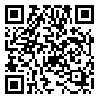BibTeX | RIS | EndNote | Medlars | ProCite | Reference Manager | RefWorks
Send citation to:
URL: http://ioh.iums.ac.ir/article-1-1214-en.html
Background and aim : Emergency workers because of encounter with traumatic events are exposed to high stress. The aim of study was, the predicting mental health based on the combined role of work locus of control and job stress.
Methods : In this study 160 members of Tehran Emergency workers were selected through cluster sampling method and fills the questionnaires of job stress questionnaire, work locus of control questionnaire and general health questionnaire. Statistical analysis of data was performed with Pearson correlation and regression analysis.
Results: The results showed there is negative significant relationship between job stress and mental health. In addition, there are significant positive and negative correlation relationships between internal and external locus of control and mental health respectively. Furthermore, stepwise multivariate regression analysis showed that the subscales of demands, colleagues, external locus of control, and supervisors have predicted mental health.
Conclusions: According to the findings of the present study, mental health can be estimated on the basis of two effective factors of job stress and work locus of control.
Received: 2014/11/27 | Accepted: 2015/05/25 | Published: 2015/12/16
| Rights and permissions | |
 |
This work is licensed under a Creative Commons Attribution-NonCommercial 4.0 International License. |





